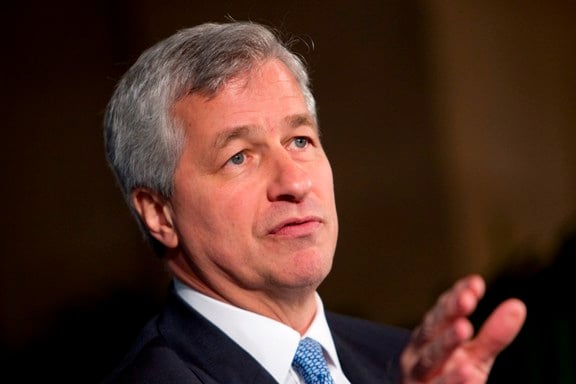

Jamie Dimon is the latest prominent voice on Wall Street to sound the alarm on tariffs, cautioning that newly introduced levies could weigh on economic growth, drive up inflation and threaten the United States’ global relationships.
In his annual shareholder letter, the JPMorgan Chase chief executive outlined a range of economic and geopolitical concerns, but placed particular emphasis on the potential damage from tariffs recently introduced by President Donald Trump.
The letter from Dimon warned that these measures could raise input costs, push domestic prices higher, and slow economic expansion.
“Whether or not the menu of tariffs causes a recession remains in question, but it will slow down growth,” Dimon wrote.
Dimon’s message comes at a time of growing unease among investors. The S&P 500 dropped 9.1 percent last week, while the Nasdaq fell 10 percent, pushing it into bear market territory. Financial stocks were among the hardest hit, as markets priced in recession risks and a potential slowdown in credit and deal activity.
The pain deepened on Monday as the S&P flirted with a bear market, briefly sinking 20 percent below a record high set less than two months ago before recovering. The Nasdaq 100 index plunged into bear territory, while equity markets worldwide flashed red with their own deep tumbles.
According to Dimon, the tariffs have introduced fresh uncertainty into an already fragile global economic environment. He flagged the potential for retaliatory measures by other countries and said the knock-on effects could hit corporate profits and the US dollar.
“The quicker this issue is resolved, the better because some of the negative effects increase cumulatively over time and would be hard to reverse. In the short run, I see this as one large additional straw on the camel’s back,” Dimon wrote.
His letter also included a longer view. While expressing hope that negotiations might lead to positive outcomes over the long term, Dimon emphasized that his “most serious concern is how this will affect America’s long-term economic alliances.” He credited those alliances with contributing to the country’s strength in global affairs.
Dimon’s tone has evolved in recent months. At the World Economic Forum in January, he downplayed the inflationary risk of tariffs, saying in a CNBC interview that “if it’s a little inflationary, but it’s good for national security, so be it.”
But by March, he had become more vocal in raising concerns, citing uncertainty as a negative force for business and investment decision-making. Dimon is not alone in his assessment. Prominent investors including Bill Ackman and Stan Druckenmiller have also expressed opposition to Trump’s tariff plan.
Ackman, the CEO of Pershing Square, called for a 90-day pause and warned of a “self-induced economic nuclear winter.”
In a post on X, he said, “If, on the other hand, on April 9 we launch economic nuclear war on every country in the world, business investment will grind to a halt, consumers will close their wallets and pocket books, and we will severely damage our reputation with the rest of the world that will take years and potentially decades to rehabilitate.”
While Druckenmiller’s comments were more restrained, he made clear in a rare social media post on X that he does not support tariffs that exceed 10 percent. Top White House adviser Kevin Hassett pushed back on the rhetoric, urging critics to moderate their tone.
“I would urge everyone, especially Bill, to ease off the rhetoric a little bit,” said the director of the White House Economic Council.
BlackRock CEO Larry Fink also alluded to the risks of aggressive tariffs last week in his own annual letter to shareholders. Part of the letter, which called for a greater democratization of private market investments, spoke of how "protectionism has returned with force," suggesting that the simmering economic frustrations were driven at least in part by the failed promise of capitalism.
"Capitalism did work — just for too few people," the BlackRock chief executive said, without mentioning Trump by name.

The quartet of deals across New York, Florida, Ohio, and New Mexico reinforces the fast-growing integrator's leading position in the independent space.

UBS and Wells Fargo have made their own additions in the Northeast, including a Massachusetts duo defecting from Commonwealth.

Goldman Sachs' new private credit fund aims to bring alternatives to 401(k) plans, joining a wave of asset managers targeting the DC market.

Don't miss your chance to be honored among the industry's best

With 102 transactions logged in the three-month period up to June, Echelon Partners is projecting a new banner year for dealmaking across the industry.
Orion's Tom Wilson on delivering coordinated, high-touch service in a world where returns alone no longer set you apart.
Barely a decade old, registered index-linked annuities have quickly surged in popularity, thanks to their unique blend of protection and growth potential—an appealing option for investors looking to chart a steadier course through today's choppy market waters, says Myles Lambert, Brighthouse Financial.
